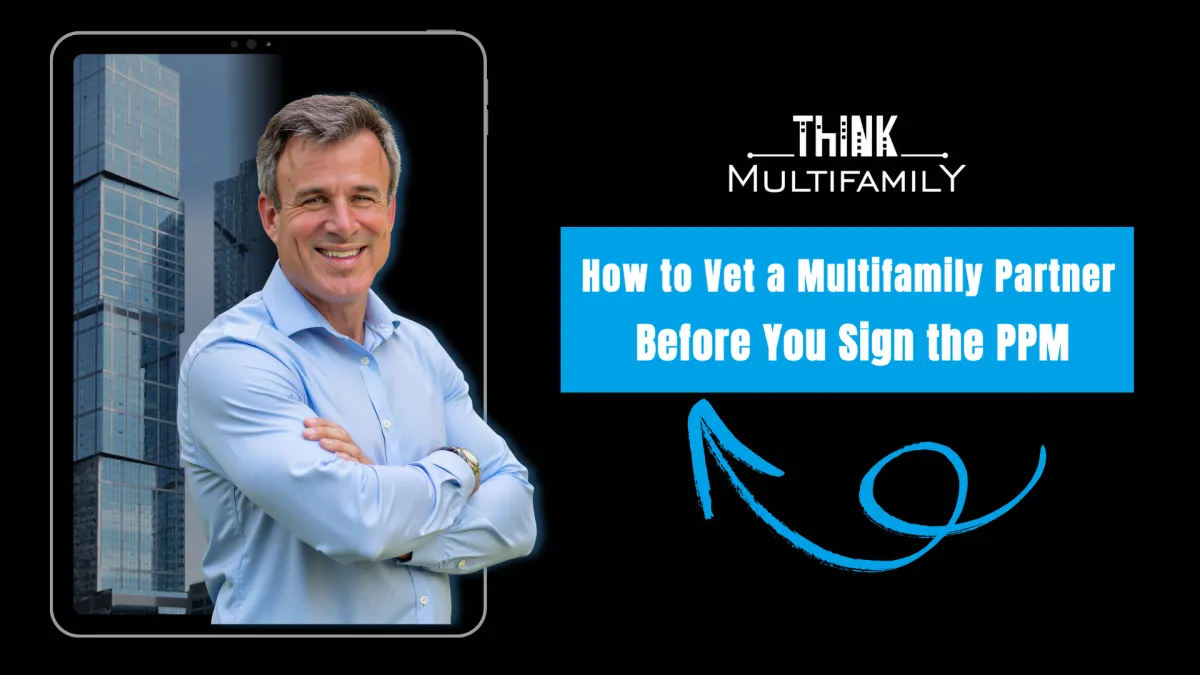
How to Vet a Multifamily Partner Before You Sign the PPM
Think Multifamily | Mark Kenney
Multifamily partnerships can be rocket fuel for your growth. The right partner fills your gaps, earns investor confidence, and helps you scale far faster than going it alone.
But the wrong partner? They can drain your capital, crush your reputation, and sink the deal before it ever gets off the ground.
We’ve lived both sides. On paper, some partnerships looked like a dream. In reality, they became costly lessons. If you’re about to team up, slow down. Because once the PPM is signed and the money is raised, there’s no undo button.
Here’s how to vet a potential multifamily partner before you commit.
1. They’ve Never Gone Full-Cycle
💡 Reality check: Anyone can buy a property. But managing it profitably, exiting cleanly, and paying investors back with a real return? That’s full-cycle—and that’s where experience gets tested.
If they’ve never done it, you’re betting on potential, not proof.
✅ Ask:
“How many deals have you taken full-cycle?”
“What were the actual results—returns, timelines, investor feedback?”
No track record doesn’t have to mean “no partner.” But if you go forward, pair them with someone seasoned—or be ready to stay in the driver’s seat yourself.
2. They Can’t Explain the Business Plan Without Buzzwords
🚨 Red flag: “We’ll force appreciation through value-add renovations, reposition the asset, optimize CapEx, and leverage upside potential.”
Looks good in a pitch deck. Means nothing without details.
✅ Ask:
“What’s our CapEx budget, and how did you validate it?”
“What’s the stabilization timeline?”
“What rents are we targeting post-renovation—and what makes you confident we’ll hit them?”
Good operators know their numbers. Great ones explain them in plain English.
3. Their “Due Diligence” Is Just Google Searches
📉 Watch for: No property tours. No lease audits. No conversations with local PMs. Just OMs and Google Maps.
That’s not diligence. That’s laziness.
✅ Real diligence includes:
Walking every unit and reviewing lease files
Confirming CapEx assumptions with contractor
Talking to nearby property managers and brokers for true comps
You can’t mitigate risk you’ve never looked for.
4. They Promise 2x Returns but Can’t Defend the Numbers
💥 “2x in three years” sounds great—until you ask for assumptions and get crickets.
Every deal has risk. A mature operator acknowledges it and shows you how they’re managing it.
✅ Ask:
“What’s the downside case?”
“Which assumptions could break this deal?”
“What loan terms are in place, and how are we hedging rate risk?”
If they get defensive or vague, walk away. Transparency beats hype every time.
5. They Don’t Share Investor References
🧾 Test of credibility: If they’ve done deals, they should have investors who will vouch for them.
“No testimonials” isn’t about privacy. It’s about performance.
✅ Ask for:
1–2 investor references (bonus points if they’re repeat investors)
Honest feedback about communication, reporting, and returns
How challenges were handled when things didn’t go to plan
If they dodge this, that’s a red flag on its own.
6. They’re Vague About GP/LP Structure
🧐 If you don’t know how profits, fees, and responsibilities are split, stop.
✅ You need clarity on:
Equity splits (who owns what % of the deal)
Who’s signing the loan, who’s doing the work, and who’s taking fees
Decision-making rights when something goes sideways
If you’re chasing answers for weeks, imagine what communication will be like mid-deal.
7. They Avoid Talking About Risk
📪 Biggest red flag of all: A partner who only sells upside is selling fantasy.
Multifamily always comes with risk. Interest rates, construction delays, tenant issues, tax hikes—the list goes on.
✅ Ask:
“What keeps you up at night about this deal?”
“Where are the top three risks, and what’s our plan B?”
“Have you had a deal go sideways—and how did you handle it?”
You don’t need a fearless partner. You need a transparent one.
Final Thought
A multifamily partnership can be your biggest accelerator—or your biggest liability. You’re not just picking a business partner. You’re choosing a co-leader, a co-risk-taker, and a co-steward of investor trust.
Vet carefully. Ask the uncomfortable questions. Dig past the shiny pitch deck. Because once you close, you’re locked in—for better or worse.
🔍 We’ve Been Burned—So You Don’t Have To
We’ve trusted the wrong partners before. We’ve paid the price—financially, emotionally, and reputationally. That’s why we teach others how to avoid those same mistakes.
👉 Want a deeper dive on how to protect your investments? [Download our free guide: The Guard Dog’s Guide to Asset Management].
⚠️ One Wrong Move Can Cost You Thousands
Get the accountability and expert guidance you need to buy apartments with confidence—and avoid expensive mistakes.